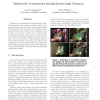Free Online Productivity Tools
i2Speak
i2Symbol
i2OCR
iTex2Img
iWeb2Print
iWeb2Shot
i2Type
iPdf2Split
iPdf2Merge
i2Bopomofo
i2Arabic
i2Style
i2Image
i2PDF
iLatex2Rtf
Sci2ools
117
click to vote
PG
2007
IEEE
2007
IEEE
Radiometric Compensation through Inverse Light Transport
Radiometric compensation techniques allow seamless projections onto complex everyday surfaces. Implemented with projector-camera systems they support the presentation of visual content in situations where projection-optimized screens are not available or not desired - as in museums, historic sites, air-plane cabins, or stage performances. We propose a novel approach that employs the full light transport between a projector and a camera to account for many illumination aspects, such as interreflections, refractions and defocus. Precomputing the inverse light transport in combination with an efficient implementation on the GPU makes the real-time compensation of captured local and global light modulations possible.
Complex Everyday Surfaces | Computer Graphics | Light Transport | PG 2007 | Radiometric Compensation Techniques |
| Added | 04 Jun 2010 |
| Updated | 04 Jun 2010 |
| Type | Conference |
| Year | 2007 |
| Where | PG |
| Authors | Gordon Wetzstein, Oliver Bimber |
Comments (0)

